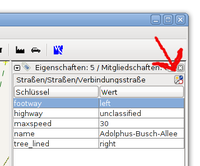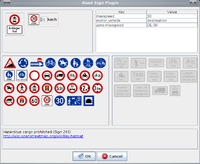JOSM/Plugins/RoadSigns
The road signs plugin offers a dialog for selection of traffic signs from a list of presets. With simple clicks you can create combinations of signs and generate tagging suggestions. There are currently presets for Belgium, Germany, Poland, Slovakia and Spain.
How to install / launch


See this page for basic installation instructions. Once JOSM has restarted, make sure you have the properties dialog open and some objects are selected. Then there should be a small button https://github.com/JOSM/josm-plugins/blob/master/RoadSigns/images/pref/roadsigns.png in the upper right corner of the properties window that launches the dialog.
Usage
Click on a sign in the left area to add it to the selection. Recommended supplementary sign are shown on the right and can be added to the main sign by left click. (Note: The gray/disabled sign are selectable as well. Use at your own risk and check the results.)
When selecting very common signs and sign combinations, it should be safe to accept the tagging suggestion. However you still need to take care of some basic things like adding the right highway=* tag (if not set by the plugin) and choosing proper direction of the way for incline=* and oneway=*.
Customization
If you like to improve an existing preset or create and maintain a sign preset for your country, you can open a ticket on JOSM trac and attach the files or contact the author directly.
How to install a custom preset
Add the following entry in the advanced preferences:
plugin.roadsigns.sources=/path/to/myroadsignpreset.xml
(The value can be either "simple" or "list" type.) The custom preset should be loaded automatically after a restart.
Images can be placed in the same folder as the preset .xml file. Alternatively, you can also specify a path for icons:
plugin.roadsigns.icon.sources=/path/to/image/folder
Preset Format
The presets are defined in an XML file format. An example would be the preset for Germany which makes use of most of the features listed below.
Some values can contain parameters like $foo, that will be replaced by the value of the parameter named foo.
The <sign> element
| Attribute | Description |
|---|---|
ref |
Short official designation of the sign that can be used for the traffic_sign=* tag. (accepts parameters)
|
id |
Unique identifier. (If missing, equals ref. Either id or ref must be present.)
|
icon |
Icon image name. (If missing, id or ref is used as image name. In this case ':' and '.' characters are converted to underscore '_'.)
|
name |
Name of the sign. (required) |
long_name |
Long (e.g. official) name of the sign. |
traffic_sign_tag |
Value that should be used for traffic_sign=* tag (if different from ref).
|
help |
Some notes to guide the user. |
wiki |
Page in the osm wiki. |
deprecated |
Set to yes if authorities have decided to no longer install signs of this kind. (But old signs may still be there and need to be recorded.)
|
useful |
(optional) The user can choose to show only a selection of the most useful signs. By default, a sign with <tag> information is treated as useful. This can be overridden by setting this attribute. Possible values: true, false.
|
The <tag> element
Some tags can be named (ident=*) and modified by other subsequent tags. If this finally results in an empty value (""), then the tag is skipped altogether. Note that the default value of a named tag is only used if there are no appending tags. E.g. access=no becomes access=delivery and not access=no;delivery.
static tags:
| Attribute | Description |
|---|---|
key |
The key text. (accepts parameters) |
value |
The value text. (accepts parameters) |
named tags:
| Attribute | Description |
|---|---|
key |
The key text. |
value |
The default value text. If the final evaluation of the value results in an empty string, the tag is dropped. |
ident |
Name a tag so it can later be changed by other tags. |
modifying tags (appending):
| Attribute | Description |
|---|---|
tag_ref |
Name of the tag to be changed. |
append_value |
Append a string to the value of the tag. The default value of the identified tag is dropped (unless there is no modifying tag appending a value). |
modifying tags (condition):
| Attribute | Description |
|---|---|
tag_ref |
Name of the tag to be changed. |
condition |
The condition to add. (K=V becomes K:cond=V.)
|
The <parameter> element
| Attribute | Description |
|---|---|
ident |
identifier to get the value of this parameter (required) |
input |
input type (currently textfield and combo are possible values) (required)
|
prefix |
text to put before the input area |
suffix |
text to put after the input area |
field_width |
for text fields: the width of the field (number of characters) |
default |
default value (required) |
The <supplementary> element
(list of recommended additional signs)
| Attribute | Description |
|---|---|
id |
The id of the supplementary sign. |
Feedback
Suggestions for better tagging and additional signs / sign combinations are welcome. Please leave a note on the discussion page. Major requests and usual bugs can be posted at the JOSM bug tracker.
Links
Inspired by:
- Verkehrszeichen Tool by Sebastian Hohmann. Basically, this plugin is a port to Java and the JOSM (plugin) system.
Related sites:
- Proposed features/Conditions for access tags —
*:hgvand*:wetis used for 1048-12 and
1048-12 and  1052-36.
1052-36.
- DE:Key:bicycle_road — For tagging German bicycle roads.
